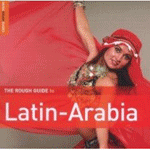|
|
 |
Dusted Reviews
Artist: V/A Album: The Rough Guide to the Music of South Africa / The Rough Guide to Latin-Arabia Label: World Music Network Review date: Mar. 27, 2007 |

|
|
|
 |
The World Music Network’s Rough Guide series is an indispensable resource in the exploration of ethnic musics of all varieties. The imprint specializes in compilations that offer a broad, if at times not inclusive, overview of the genre, region, or artist in question, and the label covers dutifully both the old and new, with subjects varying from Australian Aboriginal music to contemporary Brazilian hip hop. Two of the most recent discs from the series focus on the music of two regions that exist in stark contrast: South Africa , a country whose rich musical history is well known by listeners the world over, and the enigmatic realm of Latin-Arabia, not so much a physical space as, the clichés might say, a state of being. The discs typify well the way in which the Rough Guide compilations usually work; one a variety of music from a particular place, the other a collection of tracks in which geography is a secondary characteristic of the like-minded artists included.
The Rough Guide to the Music of South Africa , compiled by Phil Stanton, is actually the second edition of the album, the first having appeared in 1998. There’s little holdover from the disc’s previous incarnation; some artists make a repeat appearance, but only one track from Solomon Linda’s Original Evening Birds survives from the original. While the collection skews to recent years, Stanton doesn’t skimp on the more legendary figures in South African musical history, including Miriam Makeba, the aforementioned Evening Birds, and, of course, Ladysmith Black Mambazo alongside their younger compatriots. The breadth of Stanton ’s collection is laudable, from raucous and energetic pennywhistle jive to the a capella harmonization of iscathamiya and bouncy bubblegum pop that offsets traditional vocal stylings with modern instrumentation. The Soweto String Quartet represent the disc’s most distinctive offering, and the departure from pop music on “St. Agnes and the Burning Train” is a welcome surprise, and the album could benefit from a bit more of such branching out. Stanton , though, does a commendable job navigating the styles and years to span from Solomon Linda’s “Mbube,” a piece much later made famous worldwide as “The Lion Sleeps Tonight” to Lucky Dube, an internationally acclaimed, and for a time domestically reviled, reggae star.
In the assembling of The Rough Guide to Latin-Arabia, Nili Belkind faced a decidedly different task: as Stanton notes in his interview with Belkind, this was the first of the Rough Guide series to feature the music of a land that doesn’t exist. The disc explores the intersection between Arabic and Latin pop styles, focusing mainly on North African and Middle Eastern artist whose work is derived from the musical traditions of Spanish, Arabic and Caribbean populations. The Latin flavor of the tracks tends to overpower any of the Arabic flair, though there are exceptions, such as Alfredo De La Fé’s “Macando,” perhaps the disc’s best track. The majority of the disc, though, is drenched with plays on the Latin sound, and while most of the names included may be unfamiliar to the listener, Belkind has amassed a line-up of internationally renowned musicians and composers. The album certainly has a flow that trumps that of Stanton’s South African collection, for obvious reasons, and while Belkind’s collection might not be as stunningly exotic an amalgam as one might hope, tracks like the aforementioned “Macando,” and Rhany’s “Chan Chan” find an interesting middle amongst their influences.
The Rough Guide to Latin-Arabia is a smartly arranged compilation, though some might find it smooth to a fault; since Belkin works in the world music industry, her focus seems to fall on big name artists, and there can seem a bevy of glossily-produced, highly polished music on the disc. It can feel almost off-putting in this way, and an examination of the less prominent exponents of this fusion would be quite welcome. Still, especially for those to whom the big business gloss of modern world music is no deterrent, The Rough Guide to Latin-Arabia is an intriguing addition to the Rough Guide series, and the concept behind the album is one worth further exploration. While more straightforward anthologies, like The Rough Guide to the Music of South Africa will always be the imprint’s proverbial bread and butter, The Rough Guide to Latin-Arabia could be the first of a fruitful extension of the Rough Guide mission, one that departs from geographic borders and focuses on more theoretical connections. There’s a fascinating potential to the idea, and one hope’s World Music Network will encourage further releases along these lines.
By Adam Strohm
|







